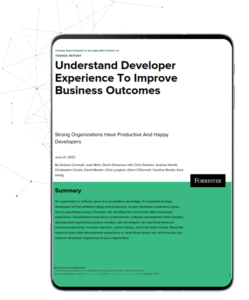 Demand for skilled developers is at an all time high in today’s rapidly evolving technology landscape. The modern world is powered by software, which means there is no shortage of opportunity available for skilled software developers and technology professionals. Faced with fierce competition to hire the best talent, many organizations are re-evaluating their current work environments to attract and retain higher caliber software development professionals. The recent Forrester report, Understand the Developer Experience to Improve Business Outcomes, examines the developer experience in-depth and provides best-practices for improving the developer experience at an organizational level.
Demand for skilled developers is at an all time high in today’s rapidly evolving technology landscape. The modern world is powered by software, which means there is no shortage of opportunity available for skilled software developers and technology professionals. Faced with fierce competition to hire the best talent, many organizations are re-evaluating their current work environments to attract and retain higher caliber software development professionals. The recent Forrester report, Understand the Developer Experience to Improve Business Outcomes, examines the developer experience in-depth and provides best-practices for improving the developer experience at an organizational level.
What Defines a Positive Developer Experience?
In the report, Forrester defines developer experience as, “the organizational capacity to create an environment where development team members thrive. This occurs by carefully measuring individual and team conditions and constantly improving those conditions with technology, software architecture, process, and culture refinements.” Organizations that fail to provide a positive developer experience face substantial, and costly, consequences. Organizations that see high developer turnover risk loss of productivity, institutional knowledge, and damage to their brand in addition to financial losses.
Improving the Developer Experience through Organizational Change
Forrester identifies tools and technologies, software architecture, processes, metrics, and culture as the five levers of developer experience. “The levers of developer experience aren’t hierarchical. At the right time, a change in one can dramatically affect the lives of software developers,” Forrester states. According to Forrester’s report, there are numerous ways to improve the developer experience, one being “Embrace a culture of resilience in the face of mistakes”. Perficient’s Judah Tice, Director of Custom Product Development, is quoted in this section of the report, providing insights on recognizing mistakes as growth opportunities.
“Accepting mistakes [is vital]. You can’t act like you can’t make mistakes. As leaders, we can’t be hard with people when they do make mistakes. They need to be hands-on, making mistakes, [learning from those mistakes, and] trying again.”
Judah Tice, Director of Custom Product Development
Thought leaders from Perficient’s Innovation+ Product Development team were interviewed by Forrester while researching this report. To learn more, download Understand The Developer Experience to Improve Business Outcomes, available for purchase or to Forrester subscribers.
Perficient’s People Promise
Perficient prioritizes professional growth and strives to enhance the developer experience with internal and external resources. We have made a promise to challenge, champion, and celebrate our people through the Perficient People Promise.
